This anthology presents a comprehensive collection of classical myths, offering primary sources in translation. Edited by Stephen M. Trzaskoma, R. Scott Smith, and Stephen Brunet, it provides a PDF version for easy access, making classical heritage accessible to students and scholars alike.
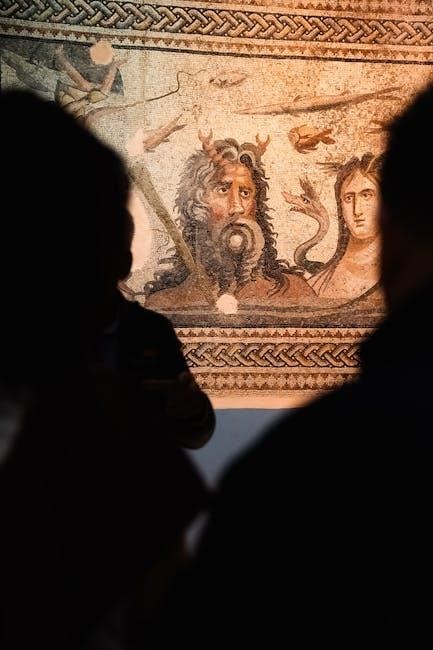
1.1 Overview of the Anthology
The anthology is a comprehensive collection of classical myths, offering primary sources in translation. Edited by Stephen M. Trzaskoma, R. Scott Smith, and Stephen Brunet, it features key texts like the Epic of Gilgamesh and Enuma Elish. The second edition includes a PDF version, enhancing accessibility for students and scholars. This anthology bridges ancient and modern scholarship, providing a foundational resource for understanding classical mythology’s literary and cultural significance.
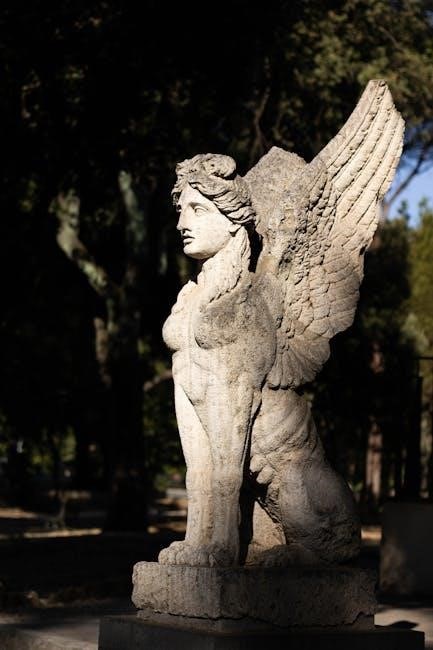
1.2 Importance of Classical Mythology
Classical mythology is a cornerstone of Western cultural heritage, shaping literature, art, and philosophy. It provides insights into the beliefs, values, and traditions of ancient civilizations. The anthology highlights the enduring relevance of myths, exploring themes like heroism, morality, and the human condition. These stories continue to influence modern media, literature, and thought, making their study essential for understanding cultural and historical contexts. The anthology’s primary sources in translation ensure these timeless narratives remain accessible and meaningful for contemporary audiences.
1.3 Purpose of the Anthology
The anthology aims to provide a comprehensive resource for studying classical mythology through primary sources in translation. It seeks to bridge the gap between ancient texts and modern readers, offering accessible interpretations of key myths. By including Near Eastern influences like the Epic of Gilgamesh, it broadens understanding of mythological origins. The anthology serves as a foundational tool for education, enabling scholars and students to explore the cultural and historical significance of classical myths in a structured and accessible format.
Structure and Content of the Anthology
The anthology is designed to provide a comprehensive and accessible collection of classical myths, offering primary sources in translation. It aims to educate students and scholars by presenting foundational myths, including those from Near Eastern traditions like the Epic of Gilgamesh. Edited by experts such as Stephen M. Trzaskoma, R; Scott Smith, and Stephen Brunet, it ensures a reliable and engaging exploration of classical mythology.
2.1 Table of Contents
The anthology is organized into sections, starting with creation myths, followed by the pantheon of gods, hero cycles, and literary uses of myth. It includes primary sources like the Epic of Gilgamesh and the Enuma Elish, providing historical and cultural context. The table of contents also lists editions, updates, and translations, ensuring a structured approach for readers to explore classical mythology comprehensively.
2.2 Editions and Updates
The anthology is available in its second edition, featuring updated translations and expanded content. The PDF version includes a detailed table of contents and is accessible for free download. Recent updates have enhanced readability and added new primary sources, such as Near Eastern texts, ensuring a comprehensive understanding of classical mythology. The second edition is widely praised for its improved structure and inclusion of scholarly notes.
2.3 Primary Sources in Translation
This anthology includes a diverse range of primary sources, translated from ancient Greek and Near Eastern texts. The PDF edition features the Epic of Gilgamesh and Enuma Elish, alongside classical Greek myths. Translations maintain the original narratives’ integrity while ensuring accessibility for modern readers. These sources provide a foundational understanding of classical mythology, bridging ancient cultures with contemporary scholarship for students and enthusiasts alike.
Key Myths and Themes
This anthology explores foundational myths, including creation stories, divine pantheons, and hero cycles. It highlights themes of human struggle, divine intervention, and the shaping of cultural identity through myth;
3.1 Creation Myths
The anthology delves into ancient creation myths, such as the Enuma Elish and Greek cosmogonies, exploring how these narratives explain the origins of the world and humanity. These stories, often featuring primordial deities and cosmic struggles, provide insights into early societies’ understanding of existence. The PDF edition includes translated primary sources, allowing readers to engage directly with these foundational texts and their enduring cultural significance.

3.2 The Pantheon of Gods
The anthology explores the diverse pantheon of classical gods, detailing their roles, powers, and stories. From Zeus’s sovereignty to Hera’s maternal dominance, these deities embody human and natural forces. The PDF includes translated sources that highlight their cultural significance, offering insights into their worship and influence on ancient societies. This section provides a rich understanding of the gods’ complex personalities and their enduring impact on mythology and literature.
3.3 Hero Cycles and Legends
The anthology delves into the epic tales of classical heroes, such as Hercules, Perseus, and Theseus, whose legendary exploits shaped ancient Greek culture. These stories, often centered around quests and challenges, explore themes of human virtue, fate, and the struggle between mortals and the divine. The PDF includes translated sources that recount these hero cycles, offering insights into their cultural and historical significance while preserving the dramatic essence of their original narratives.

Contributors and Translators
The anthology is edited by Stephen M. Trzaskoma, R; Scott Smith, and Stephen Brunet, with contributions from Thomas G. Palaima, offering new translations of classical myths.
4.1 Stephen M. Trzaskoma
Stephen M; Trzaskoma is a distinguished scholar and editor of the Anthology of Classical Myth. His expertise in classical mythology and translation work has significantly contributed to making ancient texts accessible. Trzaskoma’s new translations in the anthology enrich the understanding of myths, ensuring their relevance for modern readers. His contributions have been praised for their clarity and fidelity to the original sources, enhancing the anthology’s educational value and scholarly appeal.
4.2 R. Scott Smith
R. Scott Smith is a prominent contributor to the Anthology of Classical Myth, known for his meticulous translations and scholarly insights. His work focuses on preserving the essence of ancient myths, making them accessible to a broad audience. Smith’s contributions to the anthology highlight his commitment to academic excellence, ensuring that the original texts’ richness is maintained in modern translations. His efforts have been instrumental in shaping the anthology’s educational and literary value.
4.3 Stephen Brunet
Stephen Brunet is a key contributor to the Anthology of Classical Myth, offering expert translations that bridge ancient texts with modern readers. His work enhances the anthology’s educational value, providing clear and precise renditions of classical myths. Brunet’s contributions are particularly noted for their accessibility, making complex narratives understandable for students and scholars alike. His involvement underscores the anthology’s commitment to preserving and transmitting classical heritage effectively.

4.4 Thomas G. Palaima
Thomas G. Palaima, a renowned scholar, contributes significantly to the Anthology of Classical Myth through his expertise in ancient languages and texts. His translations and interpretations enrich the anthology, offering deeper insights into classical myths. Palaima’s work ensures that the anthology remains a vital resource for understanding the cultural and historical contexts of classical mythology, making it accessible to both students and scholars. His contributions highlight the anthology’s commitment to academic excellence and educational value.
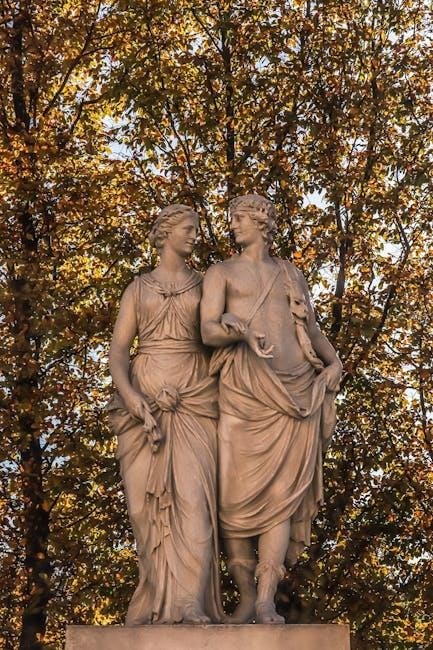
The Role of Near Eastern Texts
Near Eastern texts, like the Epic of Gilgamesh and Enuma Elish, significantly influenced classical mythology. These works provide foundational themes and motifs, shaping the anthology’s content.
5.1 The Epic of Gilgamesh
The Epic of Gilgamesh, one of humanity’s earliest surviving literary works, explores themes of friendship, mortality, and the quest for immortality. Its inclusion in the anthology highlights its profound influence on classical mythology, offering insights into shared human experiences and the evolution of mythological narratives across ancient civilizations.
5.2 The Enuma Elish (Epic of Creation)
The Enuma Elish, a Babylonian creation myth, recounts the birth of the world and the rise of Marduk as the supreme deity. This epic, included in the anthology, provides insights into Near Eastern cosmogony and its influence on classical mythology. Its themes of divine conflict and order mirror later Greek myths, showcasing shared human storytelling traditions. The PDF version of the anthology offers a translated version, accessible for modern readers to explore this foundational text.
5.3 Influence on Classical Mythology
The Near Eastern texts, such as the Enuma Elish and the Epic of Gilgamesh, have profoundly influenced classical mythology. Shared themes like creation myths, divine hierarchies, and heroism appear in both traditions. The anthology highlights these connections, showing how ancient stories evolved and were adapted across cultures. By including these primary sources in translation, the anthology bridges the gap between Near Eastern and classical traditions, offering a deeper understanding of their shared heritage and the roots of Western mythology.
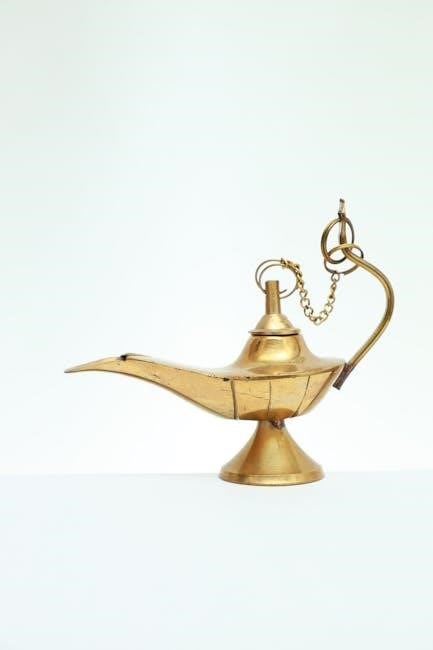
The Literary Use of Myth
This anthology explores the literary use of myth through primary sources, tracing their evolution from oral traditions to written narratives, emphasizing themes of heroism and divine struggle.
6.1 Interpretation and Definition
The anthology defines classical mythology as a collection of cultural narratives rooted in ancient traditions. It interprets myths as symbolic expressions of human experiences, values, and natural phenomena, emphasizing their role in shaping identity and understanding the cosmos. By examining primary sources in translation, readers gain insight into how myths have been adapted and reinterpreted over time, reflecting cultural evolution and enduring human concerns.
6.2 Sources for Classical Mythology
The anthology draws from a wide range of ancient sources, including Hesiod’s Theogony, Homer’s epics, and Roman texts like Ovid’s Metamorphoses. It also incorporates Near Eastern influences, such as the Epic of Gilgamesh and the Enuma Elish, to provide a broader cultural context. These primary sources, translated into accessible English, offer a rich tapestry of myths that illuminate the beliefs, values, and traditions of ancient civilizations, making classical mythology accessible to modern readers.
6.3 Evolution of Myths in Literature
Classical myths have evolved significantly through their adaptation into various literary forms. From oral traditions to written records, myths were reinterpretated by classical writers like Hesiod and Ovid, reflecting cultural shifts. The anthology highlights this evolution, showcasing how myths were reimagined over time. Primary sources, such as the Epic of Gilgamesh and the Enuma Elish, demonstrate the influence of Near Eastern texts on classical mythology. This literary journey is preserved in the anthology, offering insights into the dynamic nature of mythological narratives and their enduring appeal across centuries.
Educational Value of the Anthology
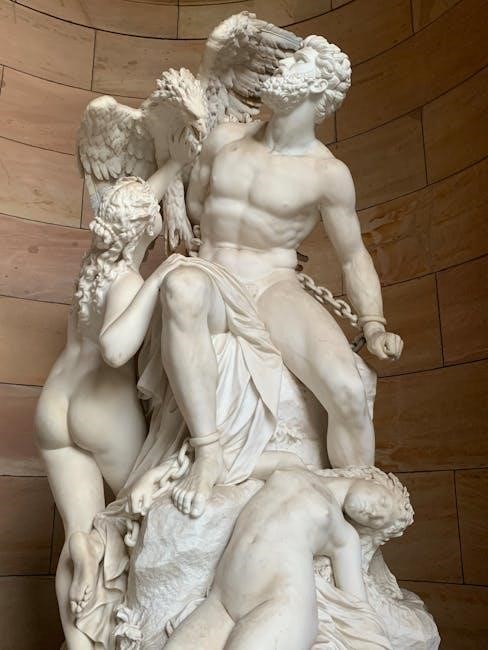
The anthology serves as an invaluable educational resource, offering primary sources in translation. Its comprehensive coverage of classical myths makes it a accessible tool for students and educators.
7.1 A Note to Students
This anthology is designed to aid students in exploring classical mythology through primary sources. Each translated text provides insights into the cultural and historical contexts of ancient myths, enhancing understanding and analysis. The PDF format ensures accessibility, allowing students to engage with the material effortlessly. Whether for coursework or personal interest, this resource offers a foundational understanding of classical mythology, making it an essential companion for academic success and intellectual enrichment.
7.2 What’s in This Book?
This anthology offers a diverse collection of classical myths, including creation stories, divine narratives, and hero legends. It features primary sources in translation, ensuring accessibility for modern readers. The PDF format includes a detailed table of contents, preface, and acknowledgments. The second edition expands on earlier versions, incorporating Near Eastern texts like the Epic of Gilgamesh and Enuma Elish. This comprehensive resource provides a rich exploration of classical mythology, making it ideal for both academic and personal study.
7.3 Bibliographical References and Index
The anthology includes a detailed section of bibliographical references, spanning pages 479 to 482, and a comprehensive index. These resources aid scholarly research and quick navigation. The PDF version retains these features, ensuring academic integrity and accessibility. The references cover primary sources and modern interpretations, while the index provides easy access to key themes, names, and concepts within the anthology, enhancing its utility for both students and researchers.
Digital Availability and Access
The anthology is available in PDF format, accessible for free download. Compatible with multiple platforms, it ensures easy reading on various devices, enhancing accessibility for all users.
8.1 PDF Format and ISBN Details
The anthology is available in PDF format, with the second edition holding the ISBN 978-1-62466-499-1 for the ebook version. Published by Hackett Publishing in 2016, the PDF ensures high-quality readability. This digital format is compatible with various devices, making it accessible for scholars and students. The PDF includes all primary sources, translations, and references, maintaining the integrity of the physical edition. Its digital availability enhances portability and ease of access for academic use.
8.2 Free Downloads and Accessibility
The anthology is widely available for free download in PDF format, ensuring accessibility for students and scholars worldwide. Platforms like academic repositories and educational websites offer the second edition, with ISBN 978-1-62466-499-1, for easy access. This digital accessibility promotes equitable learning and research opportunities. The PDF format is compatible with various devices, enabling seamless reading on smartphones, tablets, and computers.
8.4 Compatible Platforms for Reading
The Anthology of Classical Myth in PDF format is compatible with Adobe Acrobat and various e-readers. It can be accessed on smartphones, tablets, and computers running Windows, macOS, iOS, or Android. This ensures seamless reading across multiple devices, providing flexibility and accessibility for students and scholars to enhance their learning experience.

Reviews and Scholarly Reception
The anthology has received widespread acclaim for its comprehensive approach and inclusion of Near Eastern texts, enhancing its status as a foundational resource in classical studies.
9.1 Academic Reviews
Scholars praise the anthology for its meticulous translations and inclusion of Near Eastern texts, such as the Epic of Gilgamesh, enriching the understanding of classical mythology’s roots. The second edition’s expanded content, including the Enuma Elish, has been particularly commended for bridging cultural and literary gaps. Reviewers highlight its accessibility and scholarly depth, making it an indispensable resource for both researchers and students. The PDF format has also been lauded for its ease of access and readability.
9.2 Student Feedback
Students have praised the anthology for its clarity and accessibility, particularly in the PDF format, which makes it easy to navigate. The inclusion of primary sources and translations has been highlighted as invaluable for understanding classical myths. Many appreciate the structured approach, with the table of contents and preface providing clear guidance. The anthology’s focus on both Greek and Near Eastern texts, such as the Epic of Gilgamesh, has been commended for offering a well-rounded perspective on mythology.
9.3 Comparative Analysis with Other Anthologies
Scholars have compared this anthology favorably to others, noting its comprehensive coverage and expert translations. Its inclusion of primary sources, such as the Epic of Gilgamesh, sets it apart from other anthologies. The PDF format enhances accessibility, making it a valuable resource for students and researchers alike. This anthology’s structured approach and digital features make it a standout in classical mythology studies.
The Future of Classical Mythology Studies
The anthology’s digital availability in PDF format and inclusion of Near Eastern texts like Gilgamesh and Enuma Elish highlight its role in shaping future classical mythology studies through accessible, diverse primary sources.
10.1 Modern Relevance of Classical Myths
Classical myths remain relevant today, offering insights into human nature, ethics, and cultural evolution. The anthology’s PDF format ensures accessibility, making these timeless stories available for modern audiences to explore universal themes, fostering a deeper understanding of contemporary issues through ancient narratives.
10.2 Digital Scholarship and Mythology
Digital scholarship has transformed the study of classical mythology, with the anthology’s PDF edition exemplifying this shift. By digitizing ancient texts, scholars can analyze and share myths more efficiently, enabling global access and fostering interdisciplinary research. This approach bridges the gap between traditional studies and modern technology, ensuring mythology remains vibrant and accessible in the digital age.
10.3 Expanding the Anthology
The anthology is continually enriched by incorporating new translations and expanded sources, including Near Eastern texts like the Epic of Gilgamesh and the Enuma Elish. These additions broaden the scope of classical mythology, offering readers a deeper understanding of its origins and evolution. Future editions aim to include more diverse perspectives, ensuring the anthology remains a vital resource for scholars and students alike, bridging ancient traditions with modern accessibility.